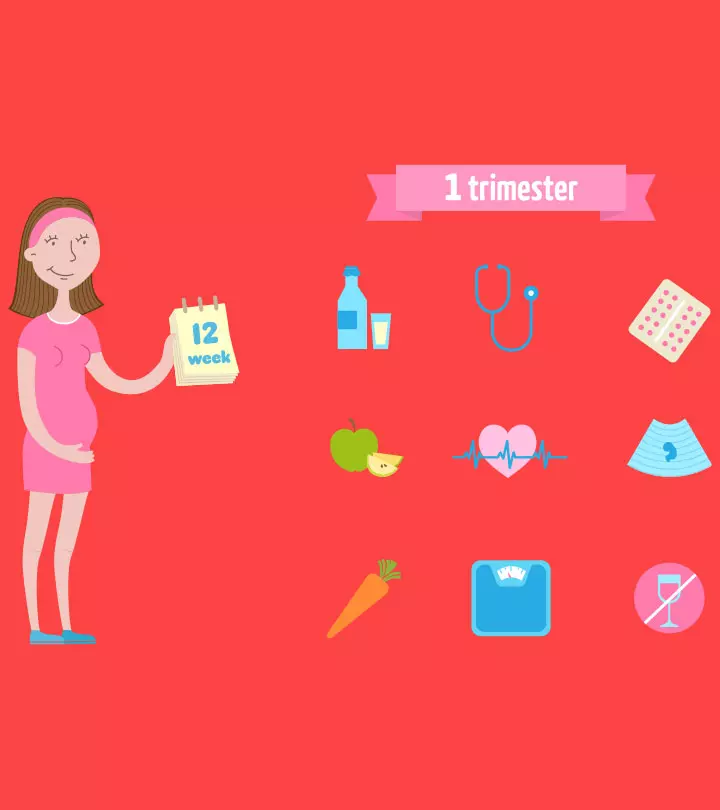
Image: iStock
A urinary tract infection (UTI) is a bacterial infection that causes inflammation in the urinary tract. Escherichia coli (E.coli) is the most common bacteria responsible for the condition (1) (2). UTI during pregnancy is common, with about eight percent incidence (3) due to hormonal changes and urinary stasisiUrinary retention due to incomplete emptying of the bladder from increased pressure of the growing uterus (2). The infection can be effectively treated with antibiotics upon early diagnosis. But, if left untreated, it can cause severe complications for the mother and the baby. Learn all about UTIs in pregnancy and ways to help prevent complications.
Key Pointers
- UTI is a common infection in pregnancy that occurs due to increased progesterone levels and growing uterus size.
- Common symptoms include a burning sensation while peeing, frequent urination, and low stomach pain.
- It is harmless as long as it is diagnosed early and treated with antibiotics.
- Untreated UTI in pregnancy may cause premature labor and low birth weight.
- Drinking plenty of water, taking immunity-boosting supplements, and following proper hygiene measures can help manage UTIs.
Risk Of UTIs By Pregnancy Trimester
The risk of UTIs is the highest between weeks six and 24 due to the changes in the urinary tract (1). According to the Centers for Disease Control and Prevention (CDC), 41% of UTIs occur in the first trimester, followed by the second with half the occurrences and the third with 11.8% (3).
Symptoms Of UTI In Pregnancy

Image: IStock
UTIs during pregnancy may either be symptomatic or asymptomatic. According to performed research, two to seven percent of pregnant women with UTIs are asymptomatic (2). The common symptoms of UTI during pregnancy include (1):
- Burning sensation, discomfort, or pain while peeing
- Frequent urgency to urinate with a complete inability to hold the urge
- Disturbed sleep due to an increased frequency of urination
- Passing of blood or mucus with urine
- Lower abdominal pain or cramps
- Urinary incontinenceiUnintentional urine leakage due to the loss of bladder control accompanied by fever, chills, and sweats
- Sudden increase or decrease in the amount of urine
- Foul-smelling urine with a cloudy appearance
- Nausea, vomiting, and back pain if the infection affects the kidneys
- Painful sexual intercourse
You should call your doctor upon experiencing any of the above symptoms.
Causes Of UTI In Pregnancy
Although UTI may happen to pregnant and non-pregnant individuals, certain factors may increase the risk of its occurrence in pregnancy. Some common causes are:
- Pregnancy hormone:Progesterone relaxes the smooth muscles and causes urinary tract dilation. This enables urinary stasis by helping prevent complete emptying of the bladder while peeing (2) (4).
- Uterus size: The growing uterus puts pressure on the bladder, causing urine retention while peeing (5). Urinary retention leads to bacterial growth (4).
 Caution
CautionOther risk factors
- Hygiene practices: The common UTI-causing bacteria E. coli and other microorganisms are present in the stool (5). Thus, you may increase the risk of contracting UTI if you wipe yourself from back to front after defecating (4).
- Underlying conditions: Some conditions, such as sickle cell anemiaiAn inherited blood disorder that alters the morphology of red blood cells and gestational diabetesiPregnancy-induced diabetes put you at an increased risk for UTI as these conditions lower the body’s disease-fighting capacity (4).
UTI Diagnosis In Pregnancy

Image: IStock
The doctor may begin with your health history and physical examination (6). Then, they may recommend a urine test to look for disease-causing bacteria and white and red blood cells (5). Since UTIs are common in pregnancy, a urine culture test is usually a part of the prenatal checkups carried out in the first prenatal visit or at 12 to 16 weeks pregnant (7). Asymptomatic UTI needs to be treated with antibiotics if the culture shows a high number of bacteria.
 Did you know?
Did you know?Treatment Of UTI In Early Pregnancy

Image: Shutterstock
UTI in early pregnancy is commonly treated with a three- to seven-day course of oral antibiotics such as amoxicillin, ampicillin, cephalosporins, nitrofurantoin, and trimethoprim-sulfamethoxazole. The doctor may prescribe medications that are safe for both the mother and the developing fetus, considering the gestational age and importance of prenatal care. However, if the infection recurs, you may be prescribed a longer course of lower-dose antibiotics while pregnant (2) (4). This is usually combined with urine alkalinizer and plenty of fluid intake orally.
If the infection spreads to the kidneys, causing pyelonephritis, the antibiotics need to be administered intravenously at the hospital (4).
 Experts say
Experts sayComplications Of UTI In Pregnancy

Image: Shutterstock
UTI may cause complications in pregnancy if left untreated in the early stages. Some of them include (1) (5):
- Kidney infections, which may lead to premature labor and low birth weight
- Anemia
- Prolonged severe infection
In extreme cases, untreated UTI may cause fetal death (5). These complications can be prevented if you are mindful of the early symptoms.
 Quick fact
Quick factPrevention Of UTI In Pregnancy
Although it may not be possible to prevent UTI completely, you may lower your risks by following these measures (1):
- Drink ten to twelve glasses of water each day to maintain proper hydration
- Avoid refined foods, alcohol, sugar, caffeine, and fruit juices
- Consume unsweetened cranberry juice regularly
An anonymous blogger and mother of two shares how cranberry supplements helped her prevent UTI during her second pregnancy. She says, “Well, when I was pregnant with Giuliana, I had a UTI almost constantly & had to be on antibiotics quite a bit. It was awful. When I was seven months pregnant, I got a kidney infection & had to be hospitalized. It was so painful!! and very scary. So, this time around, I am doing everything I can to prevent that from happening again. So far, it (cranberry supplement) has helped tremendously! I have not had a problem yet (i)!”
- Take vitamin C, zinc, and beta-carotene supplements to boost your immune system
- Do not hold the urge to pee
- Clean your genital area by blotting it dry and avoiding rubbing
- Ensure to pee before and after sexual intercourse
- Prefer cotton underwear and change them regularly
- Avoid harsh soaps, douchesiWashing or cleaning the inside of the vagina with water or mixture of fluids. , antiseptic creams, and feminine hygiene products
- Avoid tight-fitting pants
- Do not soak yourself in a bathtub for more than 30 minutes or more than twice a day
Frequently Asked Questions
1. Can a UTI cause contractions during pregnancy?
If UTI causes pyelonephritis (kidney infection), toxins released from bacteria may cause uterine contractions, leading to premature labor (2).
2. Can UTIs affect pregnancy tests?
UTI with high white and red blood cells and nitrite levels may sometimes result in a false positive pregnancy test (8).
3. Is it safe to have sex during a UTI while pregnant?
It is usually suggested not to engage in sexual intercourse during a urinary tract infection (UTI) while pregnant until the condition resolves completely to reduce the risk of complications (1).
UTI during pregnancy is common but treatable. However, it may lead to severe consequences if left untreated. So, expectant mothers should be vigilant in identifying the initial symptoms of a UTI and seek medical attention. Early diagnosis and treatment are crucial to help prevent complications, such as preterm labor and low birth weight. Thus, it is essential to stay aware and take the necessary preventative measures to avoid infection for a healthier and safer pregnancy.
Infographic: Tips To Help Prevent UTI In Pregnancy
Although urinary tract infection in pregnancy is seldom alarming if treated on time, its symptoms can be uncomfortable and interfere with a healthy and happy pregnancy. This infographic discusses useful measures and tips to help you prevent contracting the infection and thereby avoid possible complications. Scroll down to learn more about it. Illustration: Momjunction Design Team
Illustration: UTI During Pregnancy: Causes Symptoms Risks And Treatment

Image: Stable Diffusion/MomJunction Design Team
UTI during pregnancy is common and can harm both the mother and the fetus. However, it can be avoided. Learn some advice on how to prevent UTI while pregnant in this video.
Personal Experience: Source
MomJunction articles include first-hand experiences to provide you with better insights through real-life narratives. Here are the sources of personal accounts referenced in this article.
i. {my pregnancy essentials}.https://anwjohnston.blogspot.com/2013/08/?m=0
References
- Urinary Tract Infection During Pregnancy.
https://americanpregnancy.org/healthy-pregnancy/pregnancy-complications/urinary-tract-infections-during-pregnancy/ - Patricia J. Habak and Robert P. Griggs Jr (2022); Urinary Tract Infection In pregnancy.
https://www.ncbi.nlm.nih.gov/books/NBK537047/#__NBK537047_dtls__ - Antibiotics Dispensed to Privately Insured Pregnant Women with Urinary Tract Infections — United States 2014.
https://www.cdc.gov/mmwr/volumes/67/wr/mm6701a4.htm - UTIs during pregnancy are common and treatable.
https://utswmed.org/medblog/utis-during-pregnancy/ - Why Are UTIs Common During Pregnancy;.
https://wfmchealth.org/maternity-health-care/why-are-utis-common-during-pregnancy/ - Urinary Tract and Kidney Infections in Pregnancy.
https://www.nationwidechildrens.org/conditions/health-library/urinary-tract-and-kidney-infections-in-pregnancy - Screening for Asymptomatic Bacteriuria in Adults: Recommendation Statement.
https://www.aafp.org/pubs/afp/issues/2020/0415/p489.html - Pregnancy test (beta hCG).
https://www.gloshospitals.nhs.uk/our-services/services-we-offer/pathology/tests-and-investigations/pregnancy-test-beta-hcg/
Community Experiences
Join the conversation and become a part of our nurturing community! Share your stories, experiences, and insights to connect with fellow parents.
Read full bio of Dr. Swati Chitnis
Read full bio of Aneesha Amonz
Read full bio of Rebecca Malachi
Read full bio of Reshmi Das

















